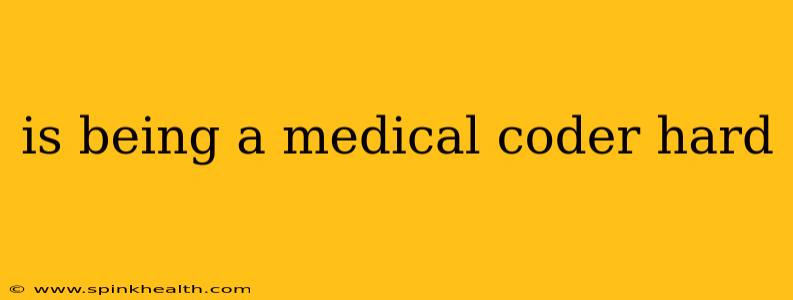Is Being a Medical Coder Hard? A Look Behind the Curtain
The question, "Is being a medical coder hard?" is one I hear often. And the answer, like many things in life, is: it depends. It’s not inherently easy, but with the right approach and dedication, it's certainly achievable and can be a rewarding career. Let's dive into the complexities and realities of this often-overlooked profession.
My journey into medical coding started unexpectedly. I was always fascinated by the intricate human body, but the thought of direct patient care filled me with anxiety. I needed a career in healthcare that utilized my analytical mind and attention to detail, and medical coding seemed like the perfect fit. It wasn't a walk in the park, though. There was a steep learning curve, and many moments where I questioned my ability to master this intricate system.
What Makes Medical Coding Challenging?
The sheer volume of information: The medical field is vast, constantly evolving, and packed with complex terminology. Think about the sheer number of medical procedures, diagnoses, and medications. Each has a specific code, and keeping up with updates and changes requires constant learning. This is where the dedication comes in.
Precision is paramount: One misplaced digit or incorrect code can lead to inaccurate billing and significant financial repercussions for both the provider and the patient. Accuracy is non-negotiable, and that pressure can be intense. This is not a job for someone who dislikes details or thrives on ambiguity.
Constant Learning and Adaptability: Healthcare is dynamic. New procedures, technologies, and regulations constantly emerge, requiring coders to update their knowledge and skills regularly. Continuing education is crucial for staying current and competitive.
What Makes Medical Coding Rewarding?
Intellectual Stimulation: Medical coding is more than just looking up codes. It requires problem-solving, critical thinking, and a deep understanding of medical terminology and anatomy. It's a job that keeps your mind engaged.
Contribution to Healthcare: You're playing a vital role in the smooth functioning of healthcare systems. Accurate coding ensures that healthcare providers get paid for their services, which is essential for keeping healthcare facilities operational.
Flexibility and Opportunity: There are numerous opportunities for medical coders, in various settings – hospitals, clinics, physician's offices, and even remotely. This flexibility can be a huge draw for many.
Frequently Asked Questions (PAAs)
Here are some common questions people have about the difficulty of medical coding, answered directly:
H2: Is medical coding a good career?
Whether medical coding is a "good" career depends on your personality and priorities. If you enjoy detailed work, have a strong analytical mind, and are comfortable with continuous learning, it can be an excellent choice. The job market is generally strong, offering stability and opportunities for growth.
H2: How long does it take to become a medical coder?
The time it takes varies based on your prior knowledge and learning style. Formal training programs typically last several months. However, you'll need ongoing training to stay current with industry changes.
H2: Do you need a degree to be a medical coder?
While a degree isn't strictly mandatory, many employers prefer candidates with an associate's degree or certificate in medical coding and billing. Some coders start with on-the-job training after completing a certification program.
H2: Is medical coding stressful?
Like any job, medical coding has its stressors. Meeting deadlines, ensuring accuracy under pressure, and navigating complex regulations can be demanding. However, many coders find the intellectual challenge rewarding and the work itself less stressful than other healthcare roles.
H2: How much does a medical coder make?
Salaries vary based on experience, location, and employer. Entry-level positions typically offer a decent starting salary, with the potential for significant increases with experience and specialized certifications.
In Conclusion:
Being a medical coder isn't easy, but it's certainly manageable and rewarding for the right person. If you're detail-oriented, analytical, and passionate about healthcare, and if you are prepared for ongoing learning, then a career in medical coding could be a perfect fit. The path may be challenging, but the rewards—both professional and personal—are well worth the effort.

